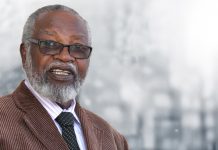By Tileni Mongudhi, Sonja Smith and Shinovene Immanuel | 30 July 2021
ANTI-CORRUPTION Commission (ACC) director general Paulus Noa pleaded to be reappointed for five more years, claiming his departure could affect ongoing high-profile corruption cases.
Experts and politicians, however, rubbished this claim.
Noa motivated his plea in a letter seen by The Namibian and sent to, among others, president Hage Geingob as the appointing authority and the National Assembly (NA) earlier this month.
“I trust I remain the preferred choice for reappointment,” he wrote, listing his achievements.
Noa appears to have gotten his way.
This week, prime minister Saara-Kuugongelwa Amadhila tabled Noa’s reappointment in parliament.
After being approved, Noa will clock up 20 years in charge of the ACC by 2026.
Noa lobbied to be reappointed on the grounds that he felt he could prove vital to the successful prosecution of ongoing cases.
“Due to my involvement in leading, supervising and issuing of summons[es] served on suspects and potential witnesses, my possible premature departure from the commission may jeopardise the outcome of court proceedings,” he wrote.
Noa is deputised by Erna van der Merwe.
During his time at the helm of the anti-graft body, Noa said, he had submitted 699 corruption dockets to prosecutor general Martha Imalwa.
He said 249 of these dockets are still pending in criminal courts.
Noa said as he had authorised these cases, the court may want him to testify to explain and justify the cases.
“Given the role I have played in supervising these corruption investigations . . . it is not ideal that the current acting director general and deputy director general are relieved from the service of the commission at this critical moment,” he said.
Noa, who was appointed as the founding ACC boss in 2006, declined to comment on his letter yesterday, citing that parliament was still discussing the president’s recommendation.
“I cannot comment on a matter pending in parliament, but in this case, there are only two appointing authorities – the president and the National Assembly,” he said.
Presidential spokesperson Alfredo Hengari said the Presidency does not have records of Noa’s plea.
In his letter, Noa said over the past 15 years he had ensured that the high standards of the ACC were upheld at all times.
He said this had avoided unnecessary legal costs resulting from lawsuits because of negligent conduct by investigators.
“Namibia has, throughout my term of office, maintained her position as one of the least corrupt countries in the SADC region, Africa and the rest of the world, according to the Transparency International Corruption Perception Index,” Noa said.
POLARISING
Noa has cut a polarising figure during his 15-year tenure as Namibia’s top graft buster.
To some, he is a hardworking, competent corruption buster.
To others, he is incompetent and was placed at the ACC to shield the political elite.
Institute for Public Policy Research executive director Graham Hopwood called for transparency in the appointment of the ACC head.
“The fact that the ACC is dealing with high-profile and complicated cases cannot be used as an excuse for keeping people in their posts in perpetuity,” Hopwood said.
He said the current recruitment process is open to abuse.
“A clear and transparent process for appointing a new DG and deputy should have been put in place at the end of last year when the terms of office ran out,’’ Hopwood said.
He added: “Unfortunately, the Anti-Corruption Act is deficient in this regard, and such decisions are left to the whims of politicians.”
Political analyst Henning Melber said the manner of Noa’s reappointment is likely to erode public trust.
“Given the recent shifts in political support, the Presidency and party might be well advised not to rule by virtue of the power still vested in them, but by confidence building and taking others on board in search of the best solutions,” he said.
Political commentator Ndumba Kamwanyah said it is a blunder on the part of Geingob and the ruling party to support Noa’s reappointment.
“Show me evidence that the ACC under Noa has made a dent in terms of delivering on the mandate of an anti-corruption organisation in a country that has sunk so deep into corruption.”
A TALE OF 15 YEARS
When former president Hifikepunye Pohamba launched the ACC in 2006, he hoped the institution would be a corruption buster.
Pohamba, who came to power amid reports of massive losses of state funds, proclaimed anti-corruption, good governance and transparency among his main objectives.
He entrusted his then prime minister Nahas Angula to lead the process of finding the country’s anti-corruption tsar.
The two ACC top positions were advertised.
The recruitment panel included Markus Kampungu, Dave Smuts and Nangula Uaandja.
But there was a problem: The panel found that most applicants were not suitably qualified or experienced, Angula told the National Assembly in 2006.
At his insistence, the panel ranked the applicants interviewed on a scale of five points.
The names were then forwarded to Pohamba for review and consideration, and Noa emerged as the preferred candidate.
It was a remarkable rise to power for Noa, who was 42 at the time.
He had worked as a magistrate at Eenhana from 1996 to 2000. From 1993 to 1996, he was a magistrate for the Ondangwa magisterial district.
Noa’s appointment as the head of the newly established ACC was greeted with fanfare.
It came at a time when the country was rocked by two major corruption scandals: The disappearance of N$100 million from the Offshore Development Company, and the N$30 million lost by the Social Security Commission in a botched investment deal with a politically connected company.
It was not long before the new corruption body was tainted by allegations of dealing with petty cases instead of tackling sophisticated high-level corruption.
A few years later, Namibia Liquid Fuel (NLF), then under investigation by the ACC for a multimillion-dollar fuel tender, announced that the ACC had cleared it of corruption.
The ACC declined to say how the investigation was conducted.
NLF was controlled by the then president’s chief economic adviser Leevi Hungamo, Sacky Shanghala (adviser to the then justice minister) and businessman James Hatuikulipi.
Noa accused the media of criticising the NLF because it was run by “black Namibians”.
Despite public complaints, Noa continued to be reappointed by Namibian political leaders.
Law-enforcement colleagues have complained about Noa’s apparent resistance to taking on cases involving prominent Namibians.
They allege he deliberately undermined some high-profile cases.
The ACC said it started looking into allegations of the now infamous Fishrot scandal, following reports in The Namibian in 2014.
Yet, action was only taken in 2019 after calls for him to resign.
There are concerns in some quarters that the Fishrot case could be diluted if Noa is left in charge.
Early last year, stakeholders in the Fishrot investigation decided to enlist assistance from the United Nations Office on Drugs and Crime and the International Anti-Corruption Conference (IACC) affiliated with Interpol.
Sources said these institutions offered experts to be seconded to the case and equipment to assist with the investigations.
It included an expert prosecutor to assist in building the state’s case.
The ACC allegedly told stakeholders at a meeting in February 2020 that as the lead investigating agency, it was not overwhelmed by the investigation.
The prosecutor general’s office, the police, the Financial Intelligence Centre and the Ministry of Justice were all represented at the meeting when the ACC told representatives of the said bodies that their assistance was not needed.
This is said to have angered a number of those present.
The ACC allegedly received tip-offs about potential corruption at the now defunct SME Bank as early as 2014 Noa is accused of failing to act on that.
In 2019 a dossier was said to be forwarded to the ACC on this matter.
It took the graft-busting body less than a week to decide not to pursue an investigation into corruption allegations.
Individuals said to be close to Geingob reportedly benefited from money stolen from the SME Bank.
This year, he unannounced that Swapo did not benefit from the Fishrot scandal – despite evidence pointing to Geingob’s ruling party campaign being funded by money siphoned from the national fishing company, Fishcor.
For many, the jury is out on Noa.






